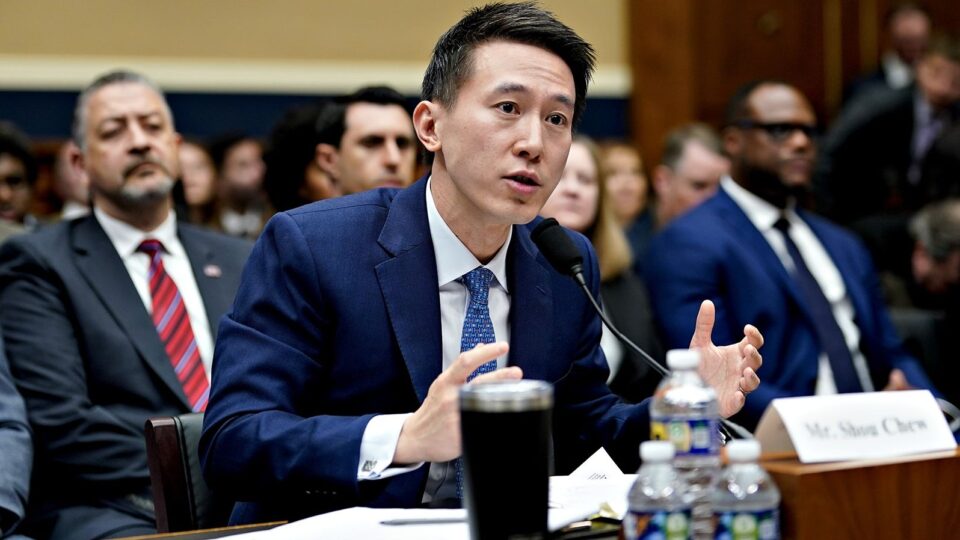Five lessons learned from the TikTok CEO’s first appearance before Congress
TikTok CEO Shou Chew was interrogated by senators during his first appearance before Congress on Thursday. They voiced profound skepticism about his company’s efforts to safeguard US user data and allay concerns about its ties to China.
The public had a rare opportunity to hear from the President because he gives so few interviews. With more than 150 million active users, his company’s app is nevertheless one of the most well-liked in America.

Here are the main lessons learned from the hearing on Thursday. About TikTok, Washington has already made up its mind.
The lengthy, contentious meeting, which lasted more than five hours, began with a lawmaker demanding that the app be banned in the United States. It provided a striking illustration of the bipartisan effort to rein in the well-liked short-form video app and the company’s uphill struggle to strengthen ties with Washington.
The chair of the House Energy and Commerce Committee, Republican Rep. Cathy McMorris Rodgers of Washington, began the hearing on Thursday by saying Shou, “Your platform should be banned.” Chew played up TikTok’s US connections and emphasized its independence from China in his testimony. In his introductory remarks, he stated that “TikTok itself is not available in mainland China, we have offices in Los Angeles and Singapore, and we currently have 7,000 people in the United States.” The possibility of unauthorized foreign access to US data and potential manipulation of the TikTok US ecosystem have raised serious concerns, Chew noted. “Our strategy has never been to brush off or minimize any of these worries. We have actually taken steps to address them.

China is not where TikTok is active. But, because the Chinese government has considerable sway over the companies that fall under its purview, the idea holds that ByteDance, and therefore indirectly TikTok, could be pressured to assist with a wide range of security measures, possibly even the handover of TikTok data.
Several of Chew’s attempts to emphasize that his business is not an extension of the Chinese government seemed to go unnoticed. The testimony of the chief executive was repeatedly stopped by members of Congress who expressed their total lack of faith in him.
The Chinese Communist Party is using TikTok as a tool to eavesdrop on you, tamper with what you see, and exploit for future generations, according to Congressman. McMorris Rodgers.
Chew defended TikTok’s continuous attempts to safeguard US user data in a conversation with California Democratic Rep. Anna Eshoo, claiming that he has “seen no proof that the Chinese government has access to that data; they have never requested us, we have not provided it.” Eshoo responded, “I find that truly absurd.
Chew replied, “I have looked inside, and I have not seen any proof of anything happening. “Our promise is to transfer their data to the United States, where it will be maintained by an American business and supervised by Americans. So, the danger would be equivalent to any government requesting data from an American corporation.
Eshoo reacted by saying, “I don’t believe that TikTok — that you have said or done anything to convince us.
The CEO of TikTok insists that its business methods are the same as those of US IT companies.
Chew also underlined that the data TikTok gathers is data “that’s commonly collected by many other firms in our industry” as lawmakers stepped up their inquiries regarding the company’s data gathering procedures.

Chew stated, “We are committed to being very open and honest with our users about what we collect.” “I don’t think what we take in is more than the majority of participants in the business.”
The claims made by Chew have been confirmed by other researchers. TikTok was the subject of a 2020 investigation by The Washington Post and a privacy researcher, who came to the conclusion that the app did not appear to collect any more data than your normal mainstream social network.
The Citizen Lab at the University of Toronto employed Taiwan-based researcher Pellaeon Lin the following year, who carried out a similar technical investigation.
Even so, TikTok still gathers a lot of data, including details on the videos you view, comments you make, private messages you send, and — if you consent to this degree of access — your precise geolocation and contact lists. (On Thursday, Chew said that American customers’ specific GPS coordinates are not currently collected by TikTok.)
TikTok’s effect on kids is a major area of attention
Although the hearing’s main focus was anticipated to be on national security, some legislators also raised issues over TikTok’s effects on youngsters.
According to research, TikTok’s algorithms suggest videos to kids that cause and worsen mental distress, such as those that promote eating disorders, self-harm, and suicide, according to ranking member of the committee and Democrat from New Jersey Frank Pallone.
The 10-year-old Pennsylvania girl who subsequently died after attempting to imitate the challenge in the video, according to Rep. Bob Latta, a Republican from Ohio, claimed TikTok promoted a video on the so-called “blackout challenge” or choking challenge to her feed.
Insufficient content control, according to Florida Republican Rep. Gus Bilirakis, creates potential for children to be exposed to material that encourages self harm.
Chew was told by Bilirakis that “your technology is literally leading to death.”
“It is unacceptable, sir, that even after knowing all these dangers, you still pretend that TikTok is something grand to behold,” he added, citing examples of hazardous content given to youngsters.

For its part, TikTok has introduced a number of features in recent months to offer additional protections for younger users. One of these features is the establishment of a new 60-minute daily time limit for users under the age of 18. But, lawmakers criticized even that provision for being too simple for teenagers to get around.
Chew received criticism for evading inquiries. TikTok said that Congress had no interest in his responses.
Rep. Tony Cárdenas, a Democrat from California, criticized Chew for what he perceived to be his subtle remarks and contrasted him with Meta CEO Mark Zuckerberg, who in the past has also irritated certain members of Congress with his testimony.
Cárdenas said to Chew, “You have been one of the few to bring this committee together.” “You resemble Mark Zuckerberg a lot, I think. I told my employees when he arrived that he reminded me of Fred Astaire since he is a fantastic dancer with words. And today, you continue to do the same. Many of your responses aren’t yes or no; they’re a little ambiguous.
In the wake of the Cambridge Analytica data scandal, Zuckerberg spent hours testifying before the same house committee in 2018. Although Chew and Zuckerberg both oversee significant social media companies, Zuckerberg was already well-known when he appeared before Congress in 2018. Chew, on the other hand, has mainly avoided the spotlight ever since he became TikTok’s CEO in 2021.
To get ready for his arrival CNN discovered on Thursday that Chew had been practicing for the past week in nearly daily, lengthy periods. Throughout these meetings, TikTok staff members tried to polish and refine Chew’s presentation. In order to prepare Chew for hours of nonstop grilling, they have played the parts of politicians and used a variety of questioning techniques.
But, TikTok said that Congress was uninterested in hearing Chew’s responses.

As the session ended, TikTok spokesperson Brooke Oberwetter issued a statement to CNN saying that Shu had been “prepared to face questions from Congress.” Nevertheless, regrettably, political egotism that ignored the effective remedies already in place dominated the day.
Perhaps no interaction on Thursday better encapsulated the hearing than the brief exchange that followed Rep. Kat Cammack’s long criticism of TikTok’s content control and connections to China.
“Chair, may I respond?” After Cammack’s allotted time was over, Chew questioned McMorris Rodgers.
McMorris Rodgers briefly thought about Chew.
“No. We will continue,” she declared.
The federal government’s rhetoric is intensified
Federal officials appeared to increase their criticism of TikTok outside the hearing room.
TikTok should be “terminated one way or another,” according to US Secretary of State Antony Blinken, but he added that “there are numerous ways to do that.” Blinken said he wasn’t sure if TikTok’s separation from its Chinese parent business would be sufficient during a separate House Foreign Affairs Committee meeting.
The senior US ambassador expressed his concern that the app poses a threat to US national security but refrained from calling for a ban. He declared, “It is clear that we, the administration, and others are concerned with the problem that it poses and are acting to confront it.
The US Treasury Department, which oversees the Committee on Foreign Investments in the United States (CFIUS), warned that it “will not clear any transaction unless it determines there are no unresolved national security concerns” in a separate statement on Thursday that avoided mentioning or specifically naming TikTok.
According to a Department spokesperson, “generally speaking, some transactions can present data security risks—including providing a foreign person or government access to troves of sensitive personal data belonging to Americans as well as access to intellectual property, source code, or other potentially sensitive information.” “CFIUS will safeguard the protection of national security, including to prevent the misuse of data through espionage, tracking, and other measures that harm national security,” according to the CFIUS policy, which is used on a case-by-case basis.
CFIUS and TikTok have been negotiating on a potential agreement for more than two years in an effort to allay US security concerns while enabling the app to continue functioning in the country.
Nonetheless, Chew made an effort to allay long-standing worries about the app in his evidence and dismissed the worries about Chinese government access to TikTok user data as “hypothetical.”
Many of the hazards mentioned, according to Chew, are merely speculative and theoretical. “I have not come across any proof. I am looking forward to dialogues where we can analyze the evidence and then address the issues that are brought up.




